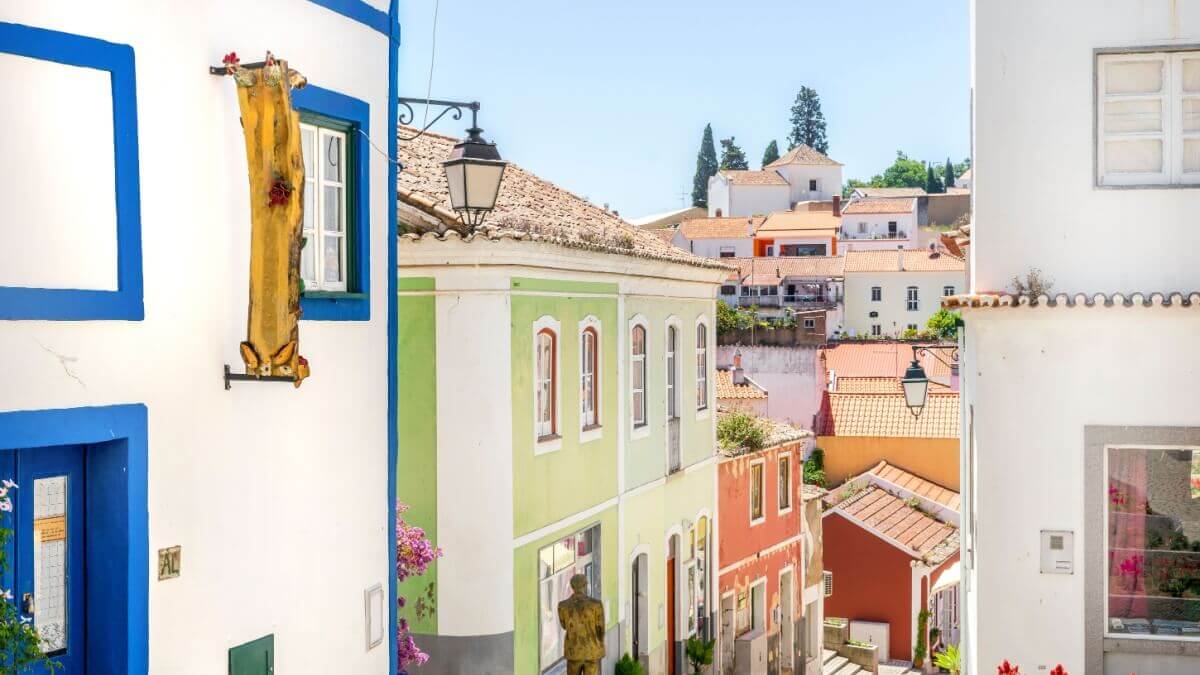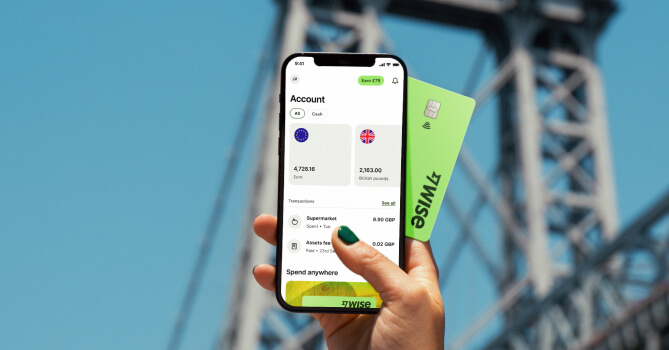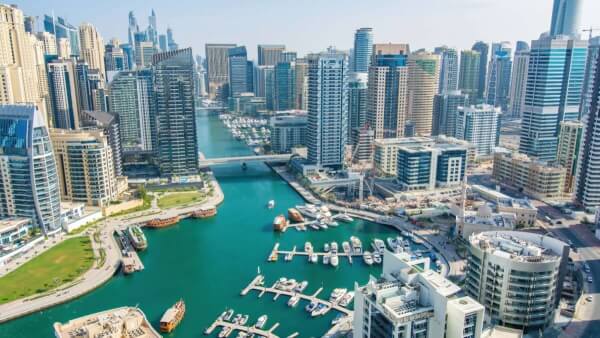How to buy a house in Japan: US guide
Interested in buying a house in Japan? Here’s everything you need to know about buying property abroad as an American.

Portugal's stunning coastlines and high quality of life make it an attractive destination for property investment. But how does getting a mortgage in Portugal work when you're not a resident?
The good news is that Portuguese banks regularly work with foreign buyers, offering mortgages with loan-to-value ratios between 65% and 75%.¹
You'll need a larger down payment than locals, but the process is relatively straightforward and has no special restrictions for foreigners.
Here's how to get a mortgage in Portugal, including legal requirements, mortgage rates and tips for getting approved.
We’ll also introduce Wise, an easy way to send money to Portugal - even for large amounts - with low transaction fees and no exchange rate markups.
Yes, you can get a mortgage in Portugal even if you're a foreigner. Many US citizens qualify for a mortgage loan in Portuguese cities like Lisbon, Porto and Coimbra.
You don't even need to move to Portugal to get a mortgage there. There's no residency requirement, and local banks are experienced in working with international buyers.
The main difference is that non-residents typically need to make a larger down payment – usually 30% of the property's value, compared to 10-20% for residents.²
Getting a mortgage in Portugal as a foreigner is surprisingly straightforward. No special legal requirements specifically target foreigners who want to buy property in Portugal.
You'll need a standard packet of documents, including a Portuguese tax number (NIF). You'll use this number for everyday transactions in Portugal, such as opening a bank account, but getting a NIF doesn't necessarily make you a tax resident in Portugal.
| 💡 Learn more about buying property abroad as an American in our full guide. |
|---|
Portuguese banks offer two main types of mortgages: fixed-rate and variable-rate options.
Fixed-rate mortgages in Portugal give you stability with consistent monthly payments throughout the term. These mortgages typically:
- Protect against interest rate fluctuations
- Last for a certain period and then may revert to a variable-rate mortgage
- Charge fines if you repay early
Getting a fixed-rate mortgage could be a good option for you if you like the idea of predictable monthly payments and don't mind having less flexibility.
Variable-rate mortgages are more common in Portugal and typically offer:
- Monthly payments that can change with market conditions
- Interest rates that are typically revised every 6 months³
- Lower early repayment penalties than fixed-rate mortgages
The interest rate on variable mortgages fluctuates based on the EURIBOR (European Interbank Offered Rate), which is the rate European banks use to lend money to each other.
According to Statista, the average interest rate on new mortgage loans in Portugal was 4.12% in 2023.⁴ As of 2024, Portuguese mortgage rates have stabilized at around 4.2%, according to Idealista and a statement by the Bank of Portugal.⁵
But mortgages in Portugal for non-residents can vary based on your down payment amount, credit history, mortgage term and other factors. You'll have a better idea of what kind of monthly mortgage payments to expect once you get in touch with a few banks.
Getting an overseas mortgage often comes with a higher initial investment in many countries. As a foreign buyer, you should expect to put down at least 30% of the property's value.²
Most Portuguese banks will lend between 65-75% of the property's value to non-residents, and you'll need to cover the remaining 25-35% as your down payment.¹
For a 300,000 EUR property, for example, you'd need to have at least 90,000 EUR saved for the down payment, and the bank would finance up to 210,000 EUR.
This is the main difference between getting a mortgage as a foreigner instead of a Portuguese resident. Portuguese residents can often secure mortgage loans with just 10-20% down.²

Now that we covered some of the basics of Portugal mortgages, you may be wondering: how to send money to pay for your property overseas?
Wise offers you a quick, secure and transparent way of sending money to Portugal. You get the mid-market exchange rate for your payments and see how much it’s charged for the transfer before sending the money from your bank.
With the Wise Account you can also hold 40+ currencies, spend money in 150+ countries, and receive like a local in 9 different currencies.
Please see Terms of Use for your region or visit Wise Fees & Pricing for the most up to date pricing and fee information
Your chances of successfully getting a mortgage in Portugal are higher if you have a solid plan. Here are a few things to keep in mind.
Bank vs. mortgage broker: Banks typically offer better rates, but mortgage brokers can navigate language barriers, handle paperwork and potentially negotiate better terms (but they'll charge a fee for their services)
Down payment: Plan to save at least 35% of your target property price to cover the minimum 30% down payment plus additional costs and any random expenses that come up
Foreign currency: Your mortgage will be in EUR, but your income may be in another currency such as USD, so pay attention to exchange rates
Credit history: Portuguese banks will look at your credit history in the US, so address any issues before applying
Rental income: If you're not planning on living in Portugal full-time, you could rent out your property for passive income, but you'll need to meet legal requirements and stay on top of taxes
Insurance requirements: Your Portuguese bank may require you to get life and/or property insurance, so you should work these costs into your budget
Legal support: A qualified property lawyer can help you avoid costly mistakes, but their expertise comes with fees
When buying property in Portugal, you need to factor in additional purchase-related costs.
| Fee type | Amount³ |
|---|---|
| Property tax (IMT) | 2-8% of property value |
| Stamp duty tax (IMI) | 0.8% of property value |
| Notary and registry fees | ~1,200 EUR |
| Legal fees | ~1,800 EUR |
Applying for a mortgage also comes with fees, such as the bank valuation fee (~280 EUR) and mortgage stamp duty tax. Mortgage-related notary and registry fees cost approximately 1,200 EUR.³
Portuguese lenders will take a close look at your financial stability and ability to repay a mortgage. Collecting debt from foreign borrowers can be challenging, so they want to be sure you're trustworthy.
You'll need the following documents to apply for a mortgage in Portugal:
- Valid passport
- Portuguese tax number (NIF)
- Proof of current address
- Recent bank statements (last 3 months)
- Proof of savings/investments
- Bank reference letter
- Property purchase agreement
- Proof of income
What kind of proof of income bank statements you need to submit depends on your type of employment.
If you're employed, you'll need to show last year's tax returns, recent payslips (last 3 months), and an employer reference letter. If you're self-employed or own your own company, you'll need tax returns, business bank statements (last 3 months), and 3 years of business financials.³
If your income comes from other sources, such as pension income or rental income, you'll need documents that demonstrate that you're financially stable.
If you're itching to get started on buying property in Portugal as a non-resident, here's the process you can expect.
Step 1. Initial assessment
Contact banks directly or work with a mortgage broker to get preliminary estimates based on your financial situation. This will give you an idea of your borrowing potential and likely interest rates.
Step 2. Mortgage quote
If you decide to move forward after the initial assessment, you'll receive a formal mortgage quote.
Step 3. Application submission
You'll need to submit your complete mortgage application and pay the application fees.
Step 4. Formal offer
The bank will review your application and, if approved, issue a formal mortgage offer explaining all terms and conditions.
Step 5. Property valuation
The bank will arrange a professional valuation of the property to confirm that the purchase price is fair and there are no legal issues.
Step 6. Completion
You'll transfer your down payment and pay the remaining fees and taxes. You'll sign both the property and mortgage deeds in front of a Portuguese notary, after which you'll officially become the property owner!
Getting a mortgage in Portugal can take anywhere from a few weeks to a few months.
It ultimately depends on how complete your application is, bank processing times and legal checks. You may also have to translate your documents into Portuguese, which can add an extra week or two.
To increase your chances of getting a mortgage in Portugal, do your best to:
- Prepare all documentation in advance
- Maintain a strong credit history
- Save more than the minimum down payment
- Be transparent about your financial situation
- Hire a qualified lawyer and/or work with an experienced mortgage broker
Portugal doesn't make it overly complicated for foreigners to get a mortgage, so as long as your finances and documents are in order, your application is likely to be successful.
There are a few refinancing options for homeowners in Portugal. You can borrow more money or extend your loan term, but you may need to pay early repayment fees. These typically fall between 2-5% of the repaid amount.⁶
Portuguese banks tend to be conservative about these requests, so make sure to demonstrate strong financial stability.
Yes, there are no restrictions on foreigners getting mortgages in Portugal, and banks actively work with non-resident buyers.
You'll need a larger down payment (typically 30%) compared to residents, but there are no special legal requirements.² You don't even need to live in Portugal to qualify.
Many Portuguese banks work with foreigners, including the Bank of Portugal (Banco de Portugal), Caixa Geral de Depósitos and Millennium BCP. The "best" bank depends on your specific situation, and you may also consider working with a mortgage broker who can compare multiple offers.
It can be easy to underestimate the total cost of buying property in Portugal, such as taxes, fees and maintenance. Also, if you want to rent out your property, you'll have to obtain a special legal license and pay relatively high taxes - typically 28%.⁷
You won't pay Portuguese income tax on earnings from outside Portugal unless you become a tax resident. But you'll still have to pay property taxes and rental income taxes. The IMI (immovable property tax) depends on the location of your property and can range from 0.3% to 0.8%. Rental income tax is typically 28%.⁷⁸
Buying property in Portugal doesn't immediately grant you residency rights. If you want to move to Portugal permanently, you'll need to apply for one of the visas that allow you to spend the entire year there, such as the D7 visa or a digital nomad visa.
Portugal also has a Golden Visa program, but real estate investments don't qualify for it anymore.
Getting a mortgage in Portugal as a foreigner is a relatively simple process with reasonable requirements. You'll need to put down a larger down payment than local buyers, but US citizens qualify for both fixed and variable-rate mortgages.
When you’re ready to go, spend like a local in Portugal with Wise. You can send high-speed, low-fee transfers - even for large amounts like your down payment.
Sources
Sources checked 11.14.2024
*Please see terms of use and product availability for your region or visit Wise fees and pricing for the most up to date pricing and fee information.
This publication is provided for general information purposes and does not constitute legal, tax or other professional advice from Wise Payments Limited or its subsidiaries and its affiliates, and it is not intended as a substitute for obtaining advice from a financial advisor or any other professional.
We make no representations, warranties or guarantees, whether expressed or implied, that the content in the publication is accurate, complete or up to date.

Interested in buying a house in Japan? Here’s everything you need to know about buying property abroad as an American.

Interested in buying a house in the Philippines? Here’s everything you need to know about buying property abroad as an American.

Interested in buying a house in Portugal? Here’s everything you need to know about buying property abroad as an American.

Interested in buying a house in Dubai? Here’s everything you need to know about buying property abroad as an American.

It's not common for Chase to hand out international mortgages, but here's what you need to know and available alternatives.

Read on for everything you need to know about getting an international mortgage from Citibank.